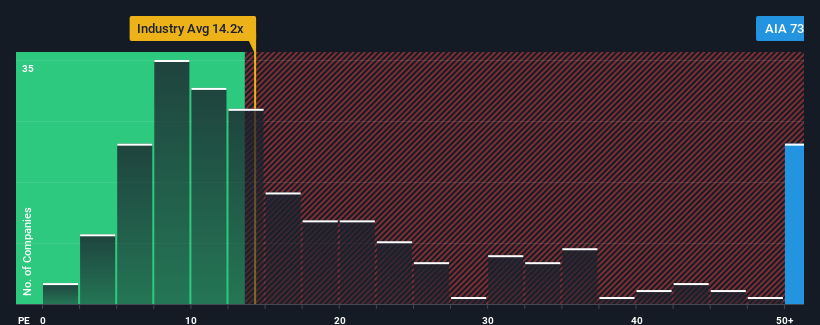- New Zealand
- /
- Infrastructure
- /
- NZSE:AIA
Auckland International Airport Limited's (NZSE:AIA) Price In Tune With Earnings

Auckland International Airport Limited's (NZSE:AIA) price-to-earnings (or "P/E") ratio of 73.4x might make it look like a strong sell right now compared to the market in New Zealand, where around half of the companies have P/E ratios below 16x and even P/E's below 10x are quite common. Nonetheless, we'd need to dig a little deeper to determine if there is a rational basis for the highly elevated P/E.
With its earnings growth in positive territory compared to the declining earnings of most other companies, Auckland International Airport has been doing quite well of late. The P/E is probably high because investors think the company will continue to navigate the broader market headwinds better than most. You'd really hope so, otherwise you're paying a pretty hefty price for no particular reason.
Check out our latest analysis for Auckland International Airport

How Is Auckland International Airport's Growth Trending?
There's an inherent assumption that a company should far outperform the market for P/E ratios like Auckland International Airport's to be considered reasonable.
Taking a look back first, we see that the company grew earnings per share by an impressive 79% last year. The latest three year period has also seen an excellent 96% overall rise in EPS, aided by its short-term performance. Accordingly, shareholders would have probably welcomed those medium-term rates of earnings growth.
Looking ahead now, EPS is anticipated to climb by 34% each year during the coming three years according to the eleven analysts following the company. That's shaping up to be materially higher than the 19% each year growth forecast for the broader market.
In light of this, it's understandable that Auckland International Airport's P/E sits above the majority of other companies. It seems most investors are expecting this strong future growth and are willing to pay more for the stock.
What We Can Learn From Auckland International Airport's P/E?
While the price-to-earnings ratio shouldn't be the defining factor in whether you buy a stock or not, it's quite a capable barometer of earnings expectations.
As we suspected, our examination of Auckland International Airport's analyst forecasts revealed that its superior earnings outlook is contributing to its high P/E. At this stage investors feel the potential for a deterioration in earnings isn't great enough to justify a lower P/E ratio. It's hard to see the share price falling strongly in the near future under these circumstances.
You should always think about risks. Case in point, we've spotted 1 warning sign for Auckland International Airport you should be aware of.
Of course, you might find a fantastic investment by looking at a few good candidates. So take a peek at this free list of companies with a strong growth track record, trading on a low P/E.
New: Manage All Your Stock Portfolios in One Place
We've created the ultimate portfolio companion for stock investors, and it's free.
• Connect an unlimited number of Portfolios and see your total in one currency
• Be alerted to new Warning Signs or Risks via email or mobile
• Track the Fair Value of your stocks
Have feedback on this article? Concerned about the content? Get in touch with us directly. Alternatively, email editorial-team (at) simplywallst.com.
This article by Simply Wall St is general in nature. We provide commentary based on historical data and analyst forecasts only using an unbiased methodology and our articles are not intended to be financial advice. It does not constitute a recommendation to buy or sell any stock, and does not take account of your objectives, or your financial situation. We aim to bring you long-term focused analysis driven by fundamental data. Note that our analysis may not factor in the latest price-sensitive company announcements or qualitative material. Simply Wall St has no position in any stocks mentioned.
About NZSE:AIA
Auckland International Airport
Provides airport facilities, supporting infrastructure, and aeronautical services in New Zealand.
Reasonable growth potential with mediocre balance sheet.

